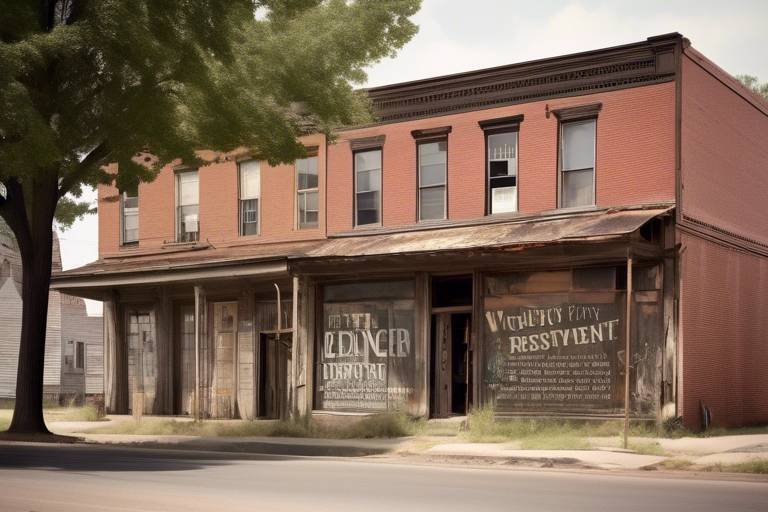How to Raise Awareness About Local Heritage Issues
Preserving local heritage is crucial for maintaining a community's identity and history. By raising awareness about local heritage issues, we can ensure that future generations appreciate and protect the cultural richness that surrounds them. Utilizing various strategies, we can engage the public in the significance of preserving historical sites and traditions that define our communities.
One effective method is to harness the power of social media platforms such as Facebook, Instagram, and Twitter. Sharing captivating stories, historical facts, and updates about local heritage sites can reach a broader audience and spark interest in safeguarding these valuable landmarks. Through engaging posts and interactive content, we can create a digital community passionate about preserving our heritage.
Collaborating with local schools presents another opportunity to instill a sense of pride and responsibility in preserving local heritage. By incorporating heritage topics into the curriculum, students can learn about the historical significance of their community and become advocates for its preservation. Education plays a vital role in fostering a deep connection to one's heritage and inspiring future generations to protect it.
Hosting community workshops focused on heritage conservation and restoration techniques empowers residents with the knowledge and skills needed to actively participate in preserving historical sites. These hands-on events not only educate participants but also create a sense of ownership and stewardship towards their local heritage. By involving the community in preservation efforts, we can ensure the sustainable safeguarding of our cultural legacy.
Creating heritage trails that guide individuals through significant historical sites in the community can offer a tangible connection to the past. These trails not only raise awareness about the area's heritage but also promote tourism and foster a sense of belonging among residents. By exploring these heritage-rich pathways, individuals can appreciate the stories and significance behind each site, fostering a deeper appreciation for local history.
Engaging local artists in showcasing the community's heritage through murals, sculptures, and art installations can visually capture the essence of historical landmarks. Art has the power to evoke emotions and spark conversations, making it an impactful medium for highlighting the importance of preserving local heritage. Through artistic expressions, we can celebrate the unique stories and traditions that define our community.
Collaborating with local businesses to support heritage initiatives can amplify efforts to raise awareness and garner community involvement. Businesses can play a vital role in promoting heritage through sponsorship, hosting events, or incorporating heritage themes into their products and services. By aligning with businesses that value local heritage, we can create a network of support that strengthens preservation efforts.
Organizing heritage festivals that celebrate local traditions, crafts, music, and cuisine provides a platform for communities to come together and honor their cultural heritage. These festivals not only showcase the diversity and richness of local traditions but also attract visitors and foster dialogue about the importance of preserving heritage. Through vibrant celebrations, we can create lasting memories and connections that reinforce the value of our shared heritage.
Establishing heritage preservation groups within the community brings together individuals passionate about protecting and promoting local heritage. These dedicated groups enable collaborative efforts to raise awareness, advocate for preservation, and take concrete actions to safeguard historical sites. By uniting like-minded individuals, we can create a strong foundation for preserving our cultural legacy for generations to come.

Utilizing Social Media Platforms
This article explores effective strategies for increasing awareness of local heritage issues within communities. From utilizing social media campaigns to organizing educational events, various methods will be discussed to engage the public in preserving and celebrating cultural heritage.
Utilizing social media platforms such as Facebook, Instagram, and Twitter can be a powerful tool in raising awareness about local heritage issues. By sharing captivating stories, historical facts, and updates about local heritage sites, communities can reach a wider audience and spark interest in preserving these valuable landmarks.

Collaborating with Local Schools
Collaborating with local schools is a crucial strategy in raising awareness about local heritage issues. By partnering with educational institutions, communities can ensure that the younger generation is actively engaged in learning about and preserving their cultural heritage. Integrating local heritage topics into school curriculums not only educates students about the historical significance of their community but also instills a sense of pride and responsibility in safeguarding it for the future.
Through collaborations with local schools, heritage organizations can conduct interactive workshops, storytelling sessions, and field trips to heritage sites. These hands-on experiences allow students to connect with their local history on a personal level, fostering a deeper appreciation for the heritage assets within their community. By involving schools in heritage preservation efforts, students are encouraged to become stewards of their heritage and actively participate in conservation initiatives.
Furthermore, partnerships with schools can extend beyond the classroom, involving students in heritage-related projects and community events. Engaging young minds in heritage preservation not only cultivates a sense of belonging and identity but also nurtures a culture of respect for the past. By collaborating with local schools, communities can ensure that the legacy of their heritage is passed down to future generations with care and reverence.

Hosting Community Workshops
This article explores effective strategies for increasing awareness of local heritage issues within communities. From utilizing social media campaigns to organizing educational events, various methods will be discussed to engage the public in preserving and celebrating cultural heritage.
Community workshops play a crucial role in empowering individuals with the knowledge and skills needed to actively participate in preserving local heritage sites. These workshops serve as educational platforms where community members can learn about heritage conservation, restoration techniques, and the historical significance of their surroundings.
By organizing workshops that focus on these aspects, participants are equipped with the tools necessary to contribute meaningfully to the preservation efforts. Through hands-on activities and informative sessions, attendees can develop a deeper understanding of the importance of safeguarding local heritage for future generations.
Furthermore, community workshops provide a space for open discussions and idea sharing among participants. This collaborative environment fosters a sense of unity and shared responsibility towards heritage preservation, encouraging individuals to take collective action in safeguarding their cultural legacy.
Moreover, workshops can serve as catalysts for sparking community engagement and involvement in heritage conservation initiatives. By actively involving residents in these educational events, a sense of ownership and pride in local heritage is cultivated, leading to increased awareness and appreciation for the historical significance of their community.
In conclusion, hosting community workshops is a powerful tool for raising awareness about local heritage issues. By providing education, fostering collaboration, and inspiring action, these workshops contribute significantly to the preservation and celebration of cultural heritage within communities.
Below are some common questions related to raising awareness about local heritage issues:
- How can social media be effectively used to promote local heritage?
- What role do local schools play in preserving cultural heritage?
- Why are heritage preservation groups important for community involvement?

Creating Heritage Trails
This article explores effective strategies for increasing awareness of local heritage issues within communities. From utilizing social media campaigns to organizing educational events, various methods will be discussed to engage the public in preserving and celebrating cultural heritage.
When it comes to creating heritage trails, it's not just about marking paths; it's about weaving a narrative through the historical tapestry of a community. Imagine walking down a trail where each step tells a story, where each turn reveals a piece of the past waiting to be discovered. These trails serve as bridges connecting the present to the past, guiding both residents and visitors on a journey through time.
By strategically placing markers, signage, and interactive elements along the trail, participants can immerse themselves in the rich history of the area. These trails not only educate but also inspire a sense of appreciation for the heritage that surrounds us. It's like embarking on a treasure hunt, with each heritage site acting as a hidden gem waiting to be unearthed.
Furthermore, heritage trails offer a unique way to engage the community, sparking conversations and fostering a collective pride in local history. They encourage exploration and curiosity, inviting individuals to delve deeper into the stories that have shaped their surroundings. By following these trails, people can develop a deeper connection to their heritage and a stronger sense of belonging to the community.

Engaging Local Artists
This article explores effective strategies for increasing awareness of local heritage issues within communities. From utilizing social media campaigns to organizing educational events, various methods will be discussed to engage the public in preserving and celebrating cultural heritage.
Harnessing the power of social media platforms such as Facebook, Instagram, and Twitter to share information, stories, and updates about local heritage sites can reach a wider audience and generate interest in preserving these important landmarks.
Partnering with schools to incorporate local heritage topics into the curriculum can educate students about the significance of their community's history and instill a sense of pride and responsibility in preserving it for future generations.
Organizing workshops that focus on local heritage conservation, restoration techniques, and historical significance can empower community members with the knowledge and skills needed to actively participate in preserving their heritage sites.
Developing heritage trails that guide residents and visitors through significant historical sites in the community can raise awareness about the area's heritage, promote tourism, and encourage a sense of connection to the local history.
Involving local artists in creating murals, sculptures, or other art installations that highlight the community's heritage can visually capture the essence of historical landmarks and spark conversations about their importance.
Partnering with local businesses to promote and support heritage initiatives through sponsorship, hosting events, or incorporating heritage themes into their products or services can help raise awareness and garner community involvement.
Hosting heritage festivals that showcase local traditions, crafts, music, and cuisine can celebrate the community's cultural heritage, attract visitors, and create opportunities for dialogue about the importance of preserving local heritage.
Forming dedicated heritage preservation groups within the community can bring together like-minded individuals who are passionate about protecting and promoting local heritage, enabling collaborative efforts to raise awareness and take action.

Collaborating with Local Businesses
Collaborating with local businesses is a crucial strategy in raising awareness about local heritage issues. By partnering with businesses in the community, heritage initiatives can gain valuable support and reach a wider audience. Local businesses can play a significant role in promoting and preserving cultural heritage through various means, such as sponsoring heritage events, incorporating heritage themes into their products or services, or hosting educational workshops on the importance of local history.
Through these collaborations, businesses can contribute to the preservation of heritage sites and traditions while also benefiting from increased community engagement and positive brand association. By aligning their efforts with heritage preservation goals, businesses can demonstrate their commitment to the community and help instill a sense of pride and responsibility among residents towards their local heritage.
Moreover, partnering with local businesses can create opportunities for innovative projects that blend heritage conservation with economic development. For example, businesses can support the creation of heritage trails or heritage-themed marketing campaigns that not only raise awareness about local history but also attract tourists and boost the local economy.

Organizing Heritage Festivals
Organizing Heritage Festivals is a vibrant and engaging way to celebrate and showcase the rich cultural heritage of a community. These festivals serve as a platform to bring together residents and visitors alike to immerse themselves in the traditions, crafts, music, and cuisine that define the local heritage.
One of the key benefits of organizing heritage festivals is the opportunity to create a lively and festive atmosphere that fosters a sense of community pride and unity. By highlighting the unique aspects of the local heritage, these events can spark conversations and interactions that deepen people's connection to their roots.
During heritage festivals, attendees can participate in various activities and experiences that offer a glimpse into the past while celebrating the present. From traditional dance performances to artisan demonstrations, each element of the festival contributes to a tapestry of cultural richness that resonates with both young and old.
Moreover, heritage festivals provide a platform for local artisans, craftsmen, and culinary experts to showcase their talents and skills, further promoting the preservation and appreciation of traditional practices. Visitors can engage with these individuals, learn about their crafts, and even purchase unique handmade products that serve as tangible reminders of the community's heritage.
By organizing heritage festivals, communities can not only attract tourists and visitors but also create a sense of belonging among residents. These events offer an opportunity for people to come together, share stories and memories, and collectively celebrate the heritage that binds them as a community.

Establishing Heritage Preservation Groups
Establishing Heritage Preservation Groups within the community is a crucial step towards safeguarding and promoting local heritage. These groups serve as a collective voice for advocating the preservation of historical sites, cultural traditions, and architectural landmarks that hold significant value to the community. By bringing together individuals who share a passion for heritage conservation, these groups can initiate collaborative efforts to raise awareness, undertake preservation projects, and engage with the public.
One of the primary benefits of forming heritage preservation groups is the opportunity to pool resources, expertise, and knowledge from diverse members of the community. This collective effort allows for a more comprehensive approach to heritage conservation, ensuring that various aspects of local history and culture are adequately represented and protected. Additionally, by establishing these groups, community members can actively participate in decision-making processes regarding the preservation and promotion of their heritage.
Heritage preservation groups also play a vital role in fostering a sense of community pride and identity. By working together to protect and showcase their shared heritage, members of these groups contribute to strengthening the community's cultural fabric and promoting a sense of belonging among residents. Through collaborative projects, events, and initiatives, these groups create opportunities for community engagement and dialogue surrounding the importance of preserving local heritage for future generations.
Furthermore, heritage preservation groups can serve as advocates for heritage conservation within local government bodies, educational institutions, and other relevant organizations. By raising awareness about the value of preserving historical sites and cultural practices, these groups can influence policies, funding decisions, and development plans to prioritize heritage protection. This advocacy role is essential in ensuring that heritage preservation remains a priority in the face of urbanization, globalization, and other contemporary challenges.
In conclusion, establishing heritage preservation groups is a proactive and effective way to mobilize community support for the preservation of local heritage. By fostering collaboration, advocacy, and community engagement, these groups play a vital role in safeguarding the unique history, traditions, and landmarks that define a community's identity. Through collective efforts and shared passion, heritage preservation groups contribute to the sustainable conservation and celebration of local heritage for generations to come.
Frequently Asked Questions
- What are local heritage issues?
Local heritage issues refer to the preservation and promotion of historical, cultural, and natural landmarks within a specific community or region. These issues encompass the protection of significant sites, traditions, and stories that hold importance to the local identity and history.
- How can social media platforms be used to raise awareness about local heritage?
Social media platforms such as Facebook, Instagram, and Twitter can be utilized to share information, images, and stories about local heritage sites. By engaging with a broader audience online, communities can generate interest, spark conversations, and encourage participation in preserving their heritage.
- Why is it important to involve local schools in heritage awareness?
Involving local schools in heritage awareness is crucial for educating the younger generation about the significance of their community's history. By integrating heritage topics into the curriculum, students can develop a sense of pride, connection, and responsibility towards preserving their cultural heritage for future generations.



















